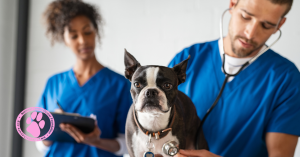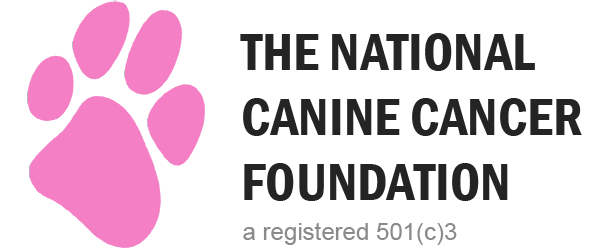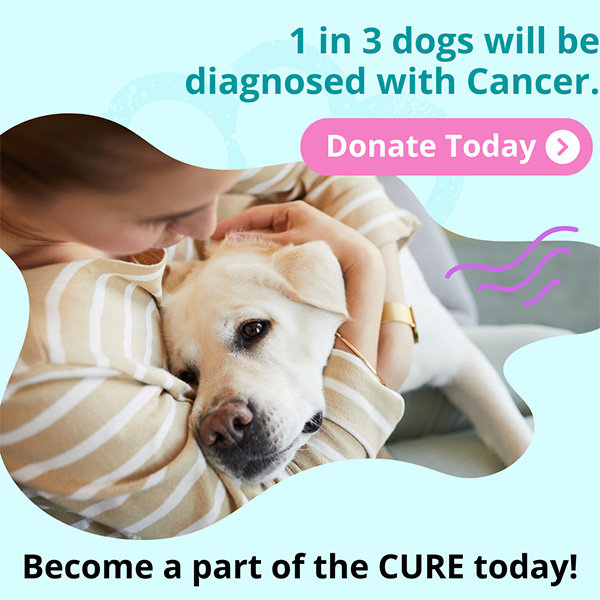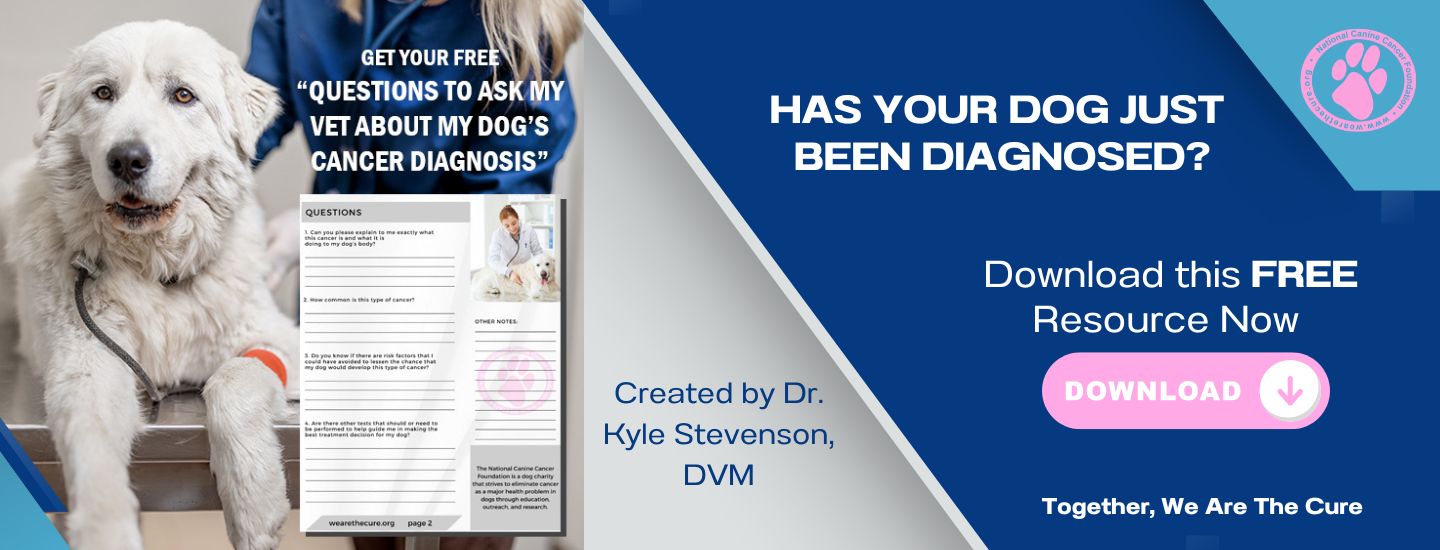In the middle of a long, hot summer, one of my favorite clients brought her sweet Dachshund, Lucy, in to see me because she had a raw, swollen spot on her lip. I wasn’t expecting to find multiple, swollen lymph nodes that fateful Friday afternoon. I wasn’t expecting to have to tell Lucy’s wonderful owners that their youngest of three dogs could potentially have incurable cancer called lymphoma.
It’s never easy to know what to say when someone’s dog might have cancer. I couldn’t help but empathize and put myself in her position:
You brought your sweet little girl to the clinic because she was acting a little bit “off” and had a raw, swollen spot on her lip. You weren’t expecting to catch your veterinarian’s face change from relaxation to concern when she was feeling your dog’s neck.  Despite her attempt
Despite her attempt
to conceal this concern, you saw it and cannot un-see it.
Then, you heard the phrase “swollen lymph nodes” coupled with “infection versus cancer,” and your whole world tipped on its axis. Despite your veterinarian’s attempt at being cautiously optimistic that this was some sort of immune system reaction to an infection or an allergic reaction, all you could think about was the possibility that my dog has cancer. What do you even do when your dog has cancer?
Understanding A Possible Dog Cancer Diagnosis
Unfortunately, as is often the case, the clinic was “crazy busy” and there wasn’t a lot of extra time available to go over all the important information about canine lymphoma. We scratched the surface by discussing the main highlights of this common form of canine cancer, but I knew that by doing so, this discussion would bring Lucy’s mom no sense of peace over the weekend. The lymph node aspirates and the blood work results that would help us to confirm our suspicions wouldn’t be back until Monday.
Three days . . . 72 hours . . . that’s a really long time to think about whether or not your beloved dog may have cancer. Even waiting one day can be excruciating. People want to do know what to do when their dog has cancer, right now, not in 72 hours.
I worried about Lucy all weekend, too, and how her owners were coping with her potential cancer diagnosis. Were they spending their weekend searching the internet for all things lymphoma-related? What information were they finding? Was this search just making them more and more stressed as the weekend continued? I am sure that this was one of the longest-feeling weekends of their lives.
This is not an uncommon scenario in the veterinary field, or in the human medical field, for that matter. Veterinary and medical professionals have a finite period of time in which they can share important information with their clients about a dog cancer diagnosis before they have to move on to their next appointment. It will have to be another appointment to talk about dog cancer treatments.
In many cases, the shock of finding out that their dog has cancer that may reduce a patient’s longevity or quality of life doesn’t allow a person’s brain to really comprehend all of the information that is being verbally shared in the exam room. The word “cancer” strikes fear into everyone’s hearts, and oftentimes that’s the only word that is dwelled upon for the rest of that particular appointment, perhaps even for the rest of that particular day.
Don’t expect yourself to have all the answers, just focus on being the best friend to your furry friend. Give yourself time to process the information and know that your veterinarian will be there to work with you when the diagnosis is clear.
When the proverbial dust has settled, and your brain has had time to catch up with what it has comprehended, where does that leave you standing with your beloved dog? You are left with more questions than answers, likely – and that’s okay.
How To Work With Your Veterinarian On A Cancer Prognosis
Before you can make a commitment to treat or not to treat your dog’s cancer, you need to know more about the type of cancer that your dog has. The best and most reliable source of this information to know how to help a dog with cancer is going to come from your veterinarian or, better yet, your veterinary oncologist.

Yes, veterinarians are busy people, but they are committed to the health and well-being of their patients and, as an extension, their clients. Do not be afraid to make another appointment with your veterinarian to sit down and talk to him/her about your dog’s cancer diagnosis in more detail, when your brain has had time to process the initial shock of the cancer diagnosis and is ready to learn more information. Your veterinarian is a trusted resource when it comes to information about your dog’s illness.
If your veterinarian does not have as much knowledge as he/she would like to with regard to the type of cancer that your dog has, a referral to a board-certified veterinary oncologist may be recommended. These specialists have received at least three years of advanced training and testing beyond veterinary school to work exclusively with dog cancer patients. Even if your veterinarian is comfortable discussing the ins and outs of your dog’s cancer diagnosis, it is never a bad idea to consider getting a second opinion from a veterinary oncologist.
These two people are fantastic resources, but we must face the reality that they are not always available when we have burning questions that we need answers to, especially when we are lying awake in the middle of the night!
Be Careful With Your Internet Research On Dog Cancer
Where do you turn to get more information about your dog’s cancer diagnosis? Are most internet websites about this subject accurate when your veterinarian isn’t available to talk to?
Begrudgingly to the majority of the veterinary community, this is where internet searching comes into play. I say begrudgingly because there are many “resources” out there on the World Wide Web that don’t provide factual or accurate information, and it is very difficult sometimes for people to sift through what is accurate and what is not. Your veterinarian doesn’t want you to get misled by information that isn’t true. “Dr. Google,” as veterinary and medical professionals have so jokingly nicknamed him, doesn’t have a medical degree and doesn’t always provide you with the best and most accurate information.
However, the internet does contain a wealth of good information, if you just know where to look for it! For starters, you can search for articles associated with a veterinary school or veterinary practice websites. These websites will often provide pet owners with downloadable brochures or files about specific forms of cancer. Veterinary oncologists may have their own personal websites or social media sites that contain information about different forms of pet cancer, and this will also be highly valuable. Articles associated with websites of organizations that fund canine cancer research are also likely to be very factual and accurate. Journal and magazine articles on the subject of canine cancer written by veterinary professionals are also going to be highly accurate; however, many of these are written with other veterinary professionals in mind as the audience, and these articles may not be as easy to understand without a medical background.
Caution must be taken towards navigating personal websites, social media groups, and blogs that are not connected in any way to veterinary professionals. While these sources of information may have factual and accurate information within them, they may also contain anecdotal information about treatment options, response rates, survival times, and treatment side effects that may not be relevant or statistically significant. If information is not repeatable via several sources, it is not likely going to be extremely helpful!
The following list of websites, while not exhaustive, contains accurate and helpful canine cancer information:
- National Canine Cancer Foundation (wearethecure.org)
- The Veterinary Cancer Society (vetcancersociety.org)
- American College of Veterinary Internal Medicine (acvim.org)
- Chase Away K9 Cancer (chaseawayK9cancer.org)
- CSU Flint Animal Cancer Center (csuanimalcancercenter.org)
- Tripawds (tripawds.com)
When you are faced with the extremely stressful and scary diagnosis of cancer with your canine best buddy, remember that there are many good informational resources available to you.
Allow yourself some time for your brain to catch up to this bad news first, but then realize that you are not alone with this dog cancer diagnosis. Lean on the professional people and websites that can provide you with helpful, accurate information about your dog’s specific type of cancer. Arm yourself with this information so that you can better understand your dog’s cancer diagnosis and what treatment option is going to be the best one for your best buddy and you.








Thank you for so much info on cancer in canines.
My ten year old pit mix has recently been diagnosed with mass cell cancer. She had two surgeries to remove all tumors and lumps and three were biopsied/aspirated. Her dr said she is clear now but there is still a lump under her front paw which, because of its location, is unable to be removed by her vet. I’m worried that if it gets larger the cancer diagnosis could change or it may impede her walking ability.
Kathleen, Thank you for sharing about your Pit mix. I am so sorry you are having to fight cancer. We hope that all goes well and the cancer does not come back. Mast Cell can be treated and survived. I hope the paw does not get worse. – Sara, Co-Founder.
Wish we had all of this information when our dog was diagnosed. She had surgery in August for oral cancer. She had to have part of her jaw removed. Now that we are in debt $8000 trying to pay for the first surgery she has another tumor on the other side of her mouth. Unfortunately we can’t afford another surgery for her, not to mention it requires removing her lower mandable and we are not going to do that to her. We are just bidding time with her. Trying to keep her happy and comfortable. Luckily she’s still eating well and playful despite her age (15) and living with cancer. Just wish we had help earlier.
I feel grateful to stumble upon this site. My 8 year old Beagle was just diagnosed with Lymphoma on his liver and I am incredibly devastated. I am ready to fight with him and do what is best so I feel incredibly overwhelmed and sad. I am happy to have these resources.
Sherri! I am so glad that you have found us! It is awful that your Beagle baby has been diagnosed but you can fight Lymphoma and I hope for a great outcome of remission for your pup. Please keep using the site as you go through this cancer journey and don’t hesitate to email us with any questions! – Sara
My little fur baby has got a tumor next to his heart and maybe on his liver. He is having a hard time breathing and am wondering with all the things going bad is it time to help him pass away
Hi Joyce – I am sorry you are having to deal with your fur baby having cancer. Our thoughts are with you at this hard time.